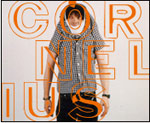Getting To The Point | |

| It's interesting how we make our own expectations up. Having read David Toop's review of Cornelius' new CD, Point, in The Wire, I set about obtaining a review copy from Matador. The editor of Tangents seemed surprised when I mentioned it: 'Bit pop for you isn't it?' he said. And it is, though I like it anyway. But I was surprised in a way I shouldn't have been when I played it. Nothing to do with David Toop's writing, just my reading of it, but I'd read his review focusing on phrases like 'an awareness of accident', 'tape hiss', 'sampled pastoralism and electronic environments'; not to mention 'digital zero' and 'incisions and absences'. I'd got Cornelius down as more of an abstract musician dealing with sound, someone to file alongside Philip Jeck or Fennesz. How wrong I was. The CD is packaged in pop-art orange and pink: diagrammatic hands pointing [geddit?] both ways on the CD itself, and [perhaps] inside and outside of the implied figure on the back packaging. [The promo CD didn't come with the front sleeve.] Perhaps most reminiscent of Stereolab: coolish, mannered, knowing retro. Which in a way is what this album is. It's a knowing reworking of lush Beach-Boys-meet-loungecore music, with enough beats and 21st century noises thrown in to the mix to alert you to the fact that it's all done slightly ironically - although there clearly isn't a hint of cynicism or lack of feeling in this stuff. Because that's the other problem with the whole thing. Read all the previous reviews and features that came with the promo CD and - apart from the fact I clearly should have heard of this guy before Toop's recent review - we find Cornelius being written about in one of two ways: the future of rock'n'roll [but not rock'n'roll as we know it], or as token Japanese musician, with all the clichés that implies: obsession to the technical, the small, the detail, the ephemeral; a product of cultural strangeness, a citizen of a country the West still can't actually cope with. Now, some of this is true - particularly the attention to detail and the technical prowess on show here - but it seems to me they miss the point. I can't for instance, see Cornelius turning up on Top of the Pops, or even in the album charts of Western Europe. My mum, for another example, wouldn't find Point particularly musical or MOR - there's too many layers in there, too many musical asides and interruptions [those 'incisions and absences' mentioned earlier]. And in a way Alistair at Tangents is correct, this is a bit 'pop' for my ears - I am more inclined to pay attention to those dealing with noise and sound more directly, whereas here we find it applied to pop music. But I do rather like it. I like the way there is far more going on in here than initially appears. I like the fact that Cornelius has come out of performance art and is 'interested in design, fashion, video, conceptual pop-art', although I'm also wary of this kind of blurb [I mean what does it actually mean, especially in relation to the music, or the person listening to the CD?], and - as you can imagine - fashion, to me, can imply all that's slight and market-led. Which isn't how I'd regard this CD. There's an experimental inquisitiveness and musical deftness underpinning this music that makes me think it's actually quite subversive and that it will last and sustain a listener's interest, in a way most pop music doesn't. The byline for David Toop's review calls Cornelius' music a 'perfect pop illusion'. To me the illusion is not that this is pop [although it clearly is]; what is strange - and perhaps this is a cultural thing - is that the composer/performer has chosen to make a subversive and genre-defying music in such a mannered and polished way, avoiding all the pitfalls and cultural backwaters that we often find 'serious' or 'experimental' music in. This is a warm, accessible, exciting and unnerving CD of knowing, disturbing pop music. This is high-gloss musical subversion. And I love it. © Rupert Loydell 2002 |